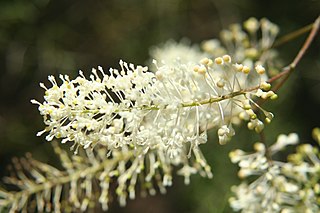
Grevillea leptopoda is a species of flowering plant in the family Proteaceae and is endemic to the south-west of Western Australia. It is a spreading to erect shrub with divided leaves, the lobes further divided, the end lobes linear, and clusters of white to cream-coloured flowers.
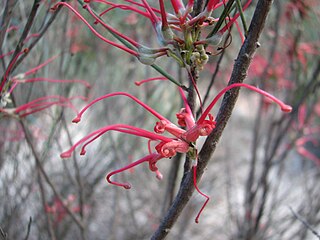
Grevillea sarissa, commonly known as wheel grevillea, is a species of flowering plant in the family Proteaceae and is native to South Australia and Western Australia. It is a spreading shrub, usually with linear leaves, and more or less erect, wheel-like to more or less spherical clusters of red or yellow flowers.

Grevillea acrobotrya is a species of flowering plant in the family Proteaceae and is endemic to the southwest of Western Australia. It is a prickly, spreading to erect shrub with egg-shaped to trowel-shaped leaves with sharply-tipped lobes, and white to cream-coloured flowers with smaller leaves at the base.
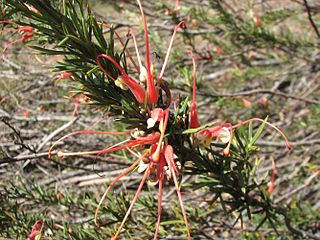
Grevillea tripartita is species of flowering plant in the family Proteaceae and is endemic to the south-west of Western Australia. It is an erect, prickly shrub with divided leaves with 3 lobes, and clusters of red and cream-coloured or reddish-orange and yellow flowers.

Grevillea parallela, also known as silver oak, beefwood or white grevillea, is a species of flowering plant in the family Proteaceae and is endemic to northern Australia. It is a single-stemmed shrub or small tree with pinnatisect or pinnatipartite leaves, the lobes linear to strap-like, and cylindrical clusters of white to cream-coloured or pale yellowish-green flowers.

Grevillea pulchella, commonly known as beautiful grevillea, is a species of flowering plant in the family Proteaceae and is endemic to the southwest of Western Australia. It is a spreading shrub usually with pinnatisect leaves, and cylindrical clusters of white to cream-coloured flowers.
Grevillea lissopleura is a species of flowering plant in the family Proteaceae and is endemic to a relatively small area of inland Western Australia. It is an erect shrub with linear leaves and clusters of white to cream-coloured flowers.

Grevillea mimosoides, commonly known as caustic bush, is a species of flowering plant in the family Proteaceae and is endemic to northern Australia. It is a shrub or small tree with curved, narrowly elliptic or egg-shaped leaves and greenish-white to cream-coloured or pale yellow flowers.

Grevillea monticola is a species of flowering plant in the family Proteaceae and is endemic to the south-west of Western Australia. It is a spreading to erect shrub with toothed to pinnatifid leaves with sometimes branched clusters of pale cream-coloured to yellowish-cream flowers.

Grevillea muelleri is a species of flowering plant in the family Proteaceae and is endemic to the a relatively small area of south-western Western Australia. It is a shrub with linear to narrowly oblong, or divided leaves with linear or narrowly egg-shaped lobes, more or less spherical clusters of white to cream-coloured flowers.

Grevillea obliquistigma is a species of flowering plant in the family Proteaceae and is endemic to the south-west of Western Australia. It is a spreading shrub with linear leaves, and conical to cylindrical clusters of creamy-white to yellowish cream-coloured flowers, sometimes tinged with pink.
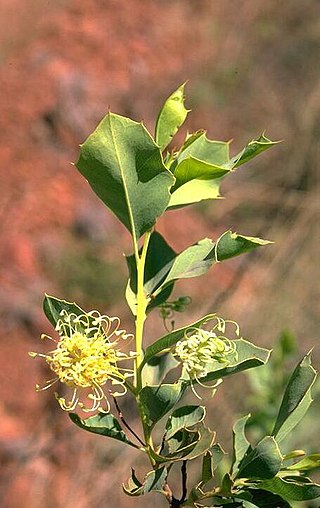
Grevillea prasina is a species of flowering plant in the family Proteaceae and is endemic to north-western Australia. It is a spreading or straggly shrub with egg-shaped to elliptic leaves with coarsely-toothed edges, and dense, cream-coloured to pale yellow flowers, the style pale green to white.
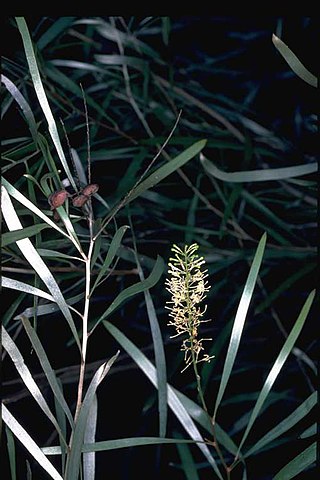
Grevillea psilantha is a species of flowering plant in the family Proteaceae and is endemic to a small area in the Kimberley region of Western Australia. It is an erect shrub with erect, linear to narrowly egg-shaped leaves, and cylindrical clusters of white to cream-coloured flowers.

Grevillea rudis is a species of flowering plant in the family Proteaceae and is endemic to the south-west of Western Australia. It is a loose, spreading to erect shrub with divided leaves, the end lobes more or less triangular to oblong and sharply pointed, and more or less cylindrical clusters of cream-coloured flowers, the style turning pink as it ages.

Grevillea scabra, commonly known as the rough-leaved grevillea, is a species of flowering plant in the family Proteaceae and is endemic to the south-west of Western Australia. It is a low, open shrub with clusters of narrowly elliptic to more or less linear leaves and small clusters of white to cream-coloured flowers.

Grevillea shuttleworthiana is a species of flowering plant in the family Proteaceae and is endemic to the south-west of Western Australia. It is a more or less erect shrub with variably-shaped leaves, the shape depending on subspecies, and cylindrical clusters of cream-coloured to yellow or greenish flowers, often held above the foliage.
Grevillea stenostachya is a species of flowering plant in the family Proteaceae and is endemic to the west of Western Australia. It is a compact shrub with pinnatipartite to almost pinnatisect leaves with 3 to 5 lobes, the end lobes cylindrical and sharply pointed, and greenish-white to creamy yellow flowers with a cream-coloured to yellow style.

Grevillea subtiliflora is species of flowering plant in the family Proteaceae and is endemic to the southwest of Western Australia. It is an open, erect shrub with pinnatisect leaves, the end lobes linear, and clusters of white flowers that are yellowish-green in the bud stage.

Grevillea trifida is species of flowering plant in the family Proteaceae and is endemic to the southwest of Western Australia. It is a spiny, erect to low spreading shrub, usually with divided, variably-shaped leaves, and clusters of white to cream-coloured flowers.
Grevillea saxicola is a species of flowering plant in the family Proteaceae and is endemic to the Pilbara region of Western Australia. It is a shrub or small tree usually with pinnatisect leaves with linear lobes, and cylindrical clusters of cream-coloured to pale yellow flowers.

















